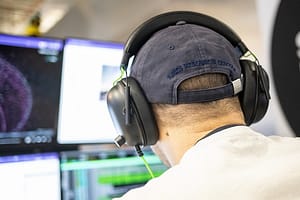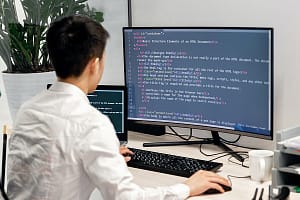Despite the remarkable advancements in AI technology over recent years, for many of us the presiding notion of ‘artificial intelligence’ is one that, for the most part, remains relevant only to sci-fi novels and movies, which romanticise (or sometimes demonise) the tech beyond its real, practical applications.
The truth is that AI is already fast-becoming a backbone for a wide range of industries. Across the board, it offers a huge array of benefits, and often paves the way for further advancements.
Read more about some real world applications for AI, below.

@Avalon.red
Court reporting
Creating word-perfect transcriptions of legal proceedings has always been a challenge for the entire legal industry, although it remains essential to ensuring that a pragmatic, truthful account of what occurs within the courtroom is created.
Verbit AI, for instance, has already proven to be invaluable within the legal industry. Not only does it ensure more than 99% accuracy – never more necessary than it is within a legal setting – but it is much more scalable, and can be used at length without risk of fatigue (leading to mistakes within the transcript) or high running costs to the court.
Fraud detection/prevention
If you have ever received a warning concerning suspicious activity on your account, then you will have experienced this remarkable technology in action. Millions of transactions are processed each day and, in the US alone, more than 1 billion credit cards are currently active.
Monitoring every single one of these transactions for possible fraud would not only require more man hours than any company can spare, but it would also prove to be impossible for any human team to survey all relevant data in order to judge whether or not a transaction was in any way suspicious.
Using big data, AI can accurately monitor an account’s habits and raise the alarm immediately following any activity that requires further verification from the card holder. In a world where speed is of the essence, this technology is invaluable.
Commercial aviation
AI is not vulnerable to the same mistakes that humans can and do make, but, as a technology, it isn’t ready to work alone. Pilots work in tandem with AI, and they are always there to ensure that everything is running as it should.
In fact, the average Airbus requires less than four minutes of manual piloting; the rest is managed by the artificial intelligence on board, and overseen by the pilots until their finesse is required again. Of course, all this is made possible by the precise confluence of other factors, such as air traffic control and other scheduled flights, but demonstrates quite how failsafe AI can be in practical settings.
AI is utilised the world over, and sometimes in the unlikeliest of places. In the vast majority of instances, it fits alongside humans and works, for the most part, quietly behind the scenes in order to support business as usual, and to make everyday easier, more efficient, and to ensure a greater level of accuracy.






Leave a Comment